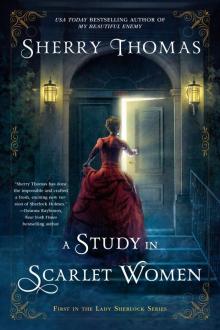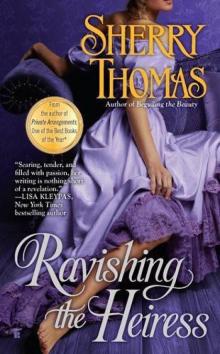- Home
- Sherry Thomas
The Hollow of Fear Page 21
The Hollow of Fear Read online
Page 21
And here she was, demonstrating precisely that lack of understanding. Even if she’d felt nothing in the summer, shouldn’t she be racked with guilt now, for going behind his back like that?
“Nevertheless,” said Miss Redmayne, “we took on Lady Ingram as a client.”
Her account accorded with what Lord Ingram had said, that they had been making progress when Lady Ingram suddenly called off the search. “We were relieved but also suspicious, which was why we finally decided to tell Lord Ingram, in case unfavorable changes were coming his way.”
Treadles had no idea who Miss Redmayne was, in truth, but he found that he believed her. Had he been wrong about Lady Ingram not loving any man enough to run away from her entire life—or was there something else at work?
“How did he take it?” asked Fowler.
“As well as anyone could be expected to take such news.”
“And this would have been . . .”
“The day before the ball in honor of Lady Ingram’s birthday.”
“During which she disappeared.”
“During which she departed,” corrected Miss Redmayne, amiably yet firmly.
“Did Sherlock Holmes predict this . . . departure?”
This question was addressed to “Sherrinford” Holmes, who said, “I wasn’t on hand for the case, but I don’t believe he was surprised that she left.”
Fowler finished his cup of tea. “Would it be at all possible to speak with the great consulting detective in person?”
“Outside of his intimates, Sherlock hasn’t received callers since his unfortunate accident,” said “Sherrinford” Holmes. “But he understands this is no ordinary visit on your part. Please come with me and please excuse the dimness of his room—he cannot tolerate strong light.”
So it would be a counterfeit then, passed off with the help of smoke and mirrors. Treadles breathed a sigh of relief.
He shouldn’t have been so worried in the first place—until she had investigated Lady Ingram’s murder to her satisfaction, Charlotte Holmes needed all the illusions she’d built around the character of Sherlock Holmes to remain intact.
Which begged the question of why he had fretted so in the first place.
You are irrational at times—more so than you want to admit.
He didn’t pursue that thought—it was a discomfiting one. And because they had now arrived before Sherlock Holmes’s room.
He held his breath. Would this deception pass muster?
The corridor already smelled medicinal. When the door opened, the odors of camphor and carbolic acid immediately rushed out. Inside the room it was indeed dim. Treadles’s eyes were first drawn to a lamp that had been placed on a shelf, which was crowded top to bottom with bottles of tinctures and compounds.
And then his gaze came to rest on the man on the bed—and he very nearly gasped aloud.
The man’s face was a horror, a crisscross of deep welts that made Treadles think of red clay soil that had been drunkenly plowed. One scar cut straight across his nose. Another pulled back his upper lip to reveal missing teeth.
Beside Treadles, Chief Inspector Fowler, who must have seen no end of disturbing sights in his life, seemed barely able to hold his revulsion in check. Even Treadles, who knew that it was all playacting, couldn’t help some very real twinges of fear and pity.
This was powerful theater, not something pulled together without both forethought and expertise. It made Treadles wonder what else had Miss Holmes arranged.
What else had she prepared for.
“Sherrinford” Holmes went to the man’s bedside. “Sherlock apologizes that he is no longer able to communicate except via touch, in a simplified Morse Code. He offers his greetings and asks whether there is anything he can do for you.”
“We are most grateful that he has received us, and sincerely sorry to disturb his repose,” Fowler managed. “If he has some insight he would like to share with us, we would be most appreciative.”
“Sherrinford” Holmes took the hand of the man on the bed and waited for some time. “Cisterns. That was his message.”
“Would he be referring to the cisterns at Mrs. Newell’s house that broke, sending her guests to Stern Hollow?” asked Fowler.
“That is correct,” confirmed “Sherrinford” Holmes.
“Thank you, Mr. Holmes,” said Fowler. “Now, if I may ask one more question. We have spoken to both Lord Ingram and Miss Redmayne about Lady Ingram’s case. But neither, thus far, has mentioned a name. Surely, Lady Ingram must have given you a name for you to begin your investigation.”
As she had done before, “Sherrinford” Holmes took the man’s hand. After half a minute, she glanced at him, a brow raised.
Then she turned back to the policemen and said, “According to Sherlock, the man’s name is . . . Moriarty.”
* * *
“Sherrinford” Holmes bade the police good night in the parlor. “I will remain with my brother tonight.”
When Chief Inspector Fowler and Treadles emerged from the house, Lord Ingram was waiting for them under the porch, in the company of a young copper who had been dispatched from the local constabulary. Lord Ingram was not smoking, but the scent of cigarette lingered.
“I apologize for keeping you away from your friends, my lord,” said Fowler. “Will you care to say a few words to Sherlock Holmes? We can wait in the carriage.”
Lord Ingram shook his head. “Sherlock Holmes is already doing what he can. He knows my situation and he knows my gratitude.”
As they climbed into the coach, Treadles couldn’t help but wonder whether, all things being equal, he himself would be as grateful. After all, would Lord Ingram be under as much suspicion if he hadn’t been seen with Miss Holmes in the summer? If the fact that he was in love with her didn’t carry such weight against his struggle to prove his innocence?
As if he heard Treadles’s thoughts, Fowler said, “We have already sent a message to be published in tomorrow’s London papers. We hope Miss Holmes will come forward promptly.”
“I’m sure she will,” said Lord Ingram. “When you meet her, do convey my regard.”
“Have you, by any chance, confessed your more tender sentiments to Miss Holmes, my lord? Or have you any plans to do so in the near future?”
“No. And no.”
Treadles winced.
“In which case, I must apologize,” said Fowler, sounding not at all sorry. “It is unlikely that we will be able to keep it a secret, as we will be speaking to her on that very subject.”
“I dare say she already knows,” answered Lord Ingram. Then, more softly, “I dare say she’s known it for years. For longer than I have, if anything.”
* * *
Charlotte, free of all disguises, regarded herself in the mirror.
“Oh, your skin is red from the glue.” Miss Redmayne tsked, fussing over her. “Here, I have some rose water. Pat it over your face. That should calm it down. Some chamomile tea also wouldn’t hurt.”
Charlotte puffed up her cheeks and moved her jaw left and right. The worst wasn’t the glue, but the modified orthodontia she’d worn for most of the day. If she never put them in her mouth again, she would consider herself blessed.
“I haven’t had the chance to thank you yet, Miss Redmayne, for coming so swiftly.”
After Charlotte had some time to think the day before—had it been only a little more than twenty-four hours since they’d received Livia’s distraught note?—it had been easy to predict that several things would happen.
One, Lord Ingram would be forced to tell as much of the truth as possible, most likely relying on the surface version of Lady Ingram’s search for her lost lover, in order to avoid touching on the fact that her perfidy had cost the lives of three agents of the Crown.
Two, the account of her search would lead to a call on Sher
lock Holmes, the one who had undertaken the endeavor for her.
Three, the police would wish to speak to Charlotte Holmes, whose rapport with Lord Ingram would become a central line of inquiry in a case that gave them little else to go on.
Charlotte didn’t mind speaking to the police, but Sherlock Holmes was a different matter. They would need to see a man. She could not meet them both as Sherlock Holmes’s sister and later as herself. And Mrs. Watson, needed for other things, couldn’t be expended on this occasion.
So among the tasks she had entrusted to Mrs. Watson to accomplish had been a cable to Miss Redmayne, begging the latter to make haste and return to England. Mrs. Watson, confident, capable Mrs. Watson, had of course executed everything perfectly.
“Don’t thank me for coming,” said Miss Redmayne. “I would have been upset if you hadn’t informed me right away. And I would have caught the first train to Calais even if you’d told me I wouldn’t be of any use here.”
She sighed. “I wish I’d been able to speak more to Ash. Poor thing, he looked—I mean, he looked fine but he seemed . . . heavyhearted.”
There was the weight of his wife’s murder—and the uncertainty of his own future. But was part of the heaviness there because he had been forced to speak truthfully of his sentiments to Charlotte, a woman he wasn’t sure understood “the full spectrum of human emotions”?
“It will be all right, won’t it, Miss Holmes?” asked Miss Redmayne.
Charlotte understood enough of human emotions to know that the girl wished for reassurance, from someone she trusted to get to the bottom of the matter. But if they’d learned anything from the debacle with Lady Ingram, it was that truth was sometimes no one’s friend.
That getting to the bottom of the matter could shatter bonds and upend lives.
“Brace yourself,” she said. “It will not be good. This is an ugly case that can lead only to an uglier end.”
In the mirror Miss Redmayne’s reflection was aghast.
Charlotte sighed inwardly. The problem was not that she didn’t always understand the full spectrum of human emotions. It was that even when she did, she still gave those close to her the opposite of what they wished for.
* * *
Lord Ingram woke up to fog-obscured windows. His watch marked a quarter past nine o’clock, almost three hours later than when he usually started his day.
Was he already becoming less starchy by first becoming lazy?
He got up, dressed, and went up to Holmes’s rooms. She wasn’t there, of course, though he wished she were.
Pleasurable pain. Painful pleasure. He couldn’t get enough of either. It would never be simple or easy between them. So he let himself luxuriate in all the gladness and all the complications.
While he still could.
All the pain and pleasure in his heart, however, did not prevent him from noticing that another person had been in the room. Not the servants—they had strict orders to leave those rooms alone unless otherwise instructed by either himself or Holmes.
Who, then? Bancroft? Or someone else?
He descended for breakfast and ate, staring at the writhing fog.
Footsteps raced across the marble floor of the entrance hall. Bancroft burst into the breakfast room, still in his overcoat, his walking stick hooked over his forearm.
Lord Ingram leaned back in his seat. He couldn’t remember the last time he saw Bancroft in such agitation. “What’s the matter?”
“When was the last time you bedded her?”
Lord Ingram stared at his brother, his mind stuttering at the baldness of the question.
Bancroft didn’t seem to notice. “Your wife. When did the two of you last sleep together?”
Oh, with Lady Ingram. “Before I inherited.”
More than three years ago, his interminable celibacy broken only yesterday evening.
“I just came from the autopsy,” said Bancroft, tapping his walking stick on the floor for emphasis. “She was with child.”
Sixteen
There were no signs of tampering on the cisterns at Mrs. Newell’s house. A Mr. Jones, who had been hired to oversee the repair and rebuilding of the cisterns, showed Inspector Treadles and Charlotte Holmes, in her full Sherrinford Holmes guise, photographs that had been taken of the cisterns, right after the accidents had happened, as well as those of the pipes leading in and out.
“They weren’t built well to begin with. Mrs. Newell got rid of her former estate manager several months ago, after it was discovered he’d been skimming from the top for almost as long as he’d been working for her, so I wouldn’t be surprised if he’d got the cheapest everything and pocketed the difference. And he hadn’t bothered with proper inspection and maintenance in the years since.
“The new estate manager seems to be a decent fellow. But his predecessor left things in such a state he hasn’t got around to the cisterns—had to replace the boiler first. Me, I’m not surprised the cisterns flooded the house, only that they didn’t do it sooner.”
The dismantled parts of the cisterns indeed appeared shoddy, brown with rust and neglect, bulging and sagging alarmingly, and almost paper thin in spots. But there were no incisions, and no marks that had been left by a saw, a hatchet, or any other tools of sabotage.
The tampering of the cisterns, coinciding with the transportation of an additional and now unaccounted-for crate to Stern Hollow, would have made for a strong, if circumstantial, case that someone was trying to frame Lord Ingram.
But now that the cisterns had turned out to be an overdue accident, this elegant house of cards came tumbling down.
Treadles swore inwardly. Miss Holmes couldn’t be pleased that her hypothesis had been proven wrong, but she gave no outward signs of disappointment, only rubbed her beard gravely as she thanked Mr. Jones.
Afterward, they found themselves alone in Mrs. Newell’s foyer, both waiting for their next appointment, Miss Holmes having applied to see her sister, and Treadles, Mrs. Newell’s cook.
“How is Lord Ingram holding up, if I may inquire?” he heard himself ask.
“I have never seen him not hold up,” said Miss Holmes. “I expect he will continue to do so.”
“But is he all right?”
Miss Holmes thought about it. “Sometimes he has hope. Other times he might be preparing himself for an unhappier future.”
Again, that inhuman detachment, as if the hangman’s noose were but a bit of a bother.
You are irrational at times—more so than you want to admit.
He recoiled. But was the voice right? What would he have thought had Miss Holmes displayed greater fear or distress?
You would have considered her far too emotional to handle an investigation with your friend’s life at stake.
“I very much hope that an unhappier future will not come to pass,” he said quietly.
Miss Holmes turned to him and inclined her head. “No matter what happens, Lord Ingram and I are both grateful to you, Inspector, for allowing us to search for the truth unhindered.”
Sometimes he still couldn’t be sure whether he’d kept his silence more out of loyalty or cowardice. But her words were clear and sincere and he was . . . touched to know that his inner struggle had not been completely in vain. That he had rendered a service to his friend.
Footsteps. Miss Olivia Holmes rushed down the grand staircase, her expression full of both anxiety and an anxious love. At the sight of Treadles, however, she stiffened.
“Good morning, Miss Holmes,” he said as she approached.
She glanced at him, then pointedly looked away, her eyes for only her sister. “You wished to see me? Is everything all right?”
Treadles’s face scalded. He had not realized that he had offended her to such an extent that she would choose to discard basic civilities.
Charlotte Holmes looked at her
sister with gentle reproach, but before she could say anything, Chief Inspector Fowler strode into the foyer. After a perfunctory greeting to Miss Olivia Holmes, he said, “Gentlemen, a word please.”
“I’ll be a second,” said Charlotte Holmes to her sister.
Her sister nodded. “I’ll wait in the white drawing room.”
“I didn’t know you were acquainted with Miss Holmes, sir,” said Fowler, when Miss Holmes had disappeared behind a set of doors.
Charlotte Holmes patted the ends of her mustache, which had been waxed to a high sheen. “I am only here as an emissary of Lord Ingram’s. He knows Miss Holmes is fearful for him and wishes to let her know that he remains in tolerable shape.”
“Most chivalrous of him.” Fowler lowered his voice. “Now, this is strictly police business, Mr. Holmes, but since Lord Bancroft Ashburton was present at the autopsy, presumably you would soon have known what he has learned, namely that, at the time of her death, Lady Ingram was with child.”
Treadles sucked in a breath.
Miss Holmes, in her imperturbable way, said only, “And the cause of death?”
This extreme sangfroid garnered her a wary look from Fowler. “The pathologist deemed likely your idea of death by excess alcohol, injected intravenously. He will be performing more tests to ascertain what substances might have been in her bloodstream.”
Charlotte Holmes nodded. “Most prudent of him.”
“I hope this will not come across as unseemly curiosity, Mr. Holmes. In your knowledge, is there any chance that the child Lady Ingram carried could have been Lord Ingram’s?”
“Anything is possible but that is highly unlikely. Their estrangement was complete, and my understanding is that it marked the end of all affections, both of the heart and of the body.”

_preview.jpg) Claiming the Duchess (Fitzhugh Trilogy Book 0.5)
Claiming the Duchess (Fitzhugh Trilogy Book 0.5) The Art of Theft
The Art of Theft The Magnolia Sword: A Ballad of Mulan
The Magnolia Sword: A Ballad of Mulan A Study In Scarlet Women
A Study In Scarlet Women The Hollow of Fear
The Hollow of Fear The Magnolia Sword
The Magnolia Sword Beguiling the Beauty ft-1
Beguiling the Beauty ft-1 The Heart is a Universe
The Heart is a Universe The Hidden Blade: A Prequel to My Beautiful Enemy (Heart of Blade)
The Hidden Blade: A Prequel to My Beautiful Enemy (Heart of Blade) Ravishing the Heiress ft-2
Ravishing the Heiress ft-2 The Immortal Heights
The Immortal Heights The Hidden Blade
The Hidden Blade Ravishing the Heiress
Ravishing the Heiress Tempting the Bride
Tempting the Bride The Luckiest Lady in London
The Luckiest Lady in London The Bride of Larkspear: A Fitzhugh Trilogy Erotic Novella
The Bride of Larkspear: A Fitzhugh Trilogy Erotic Novella Claiming the Duchess
Claiming the Duchess The One in My Heart
The One in My Heart His At Night
His At Night A Dance in Moonlight
A Dance in Moonlight A Conspiracy in Belgravia
A Conspiracy in Belgravia Not Quite a Husband
Not Quite a Husband